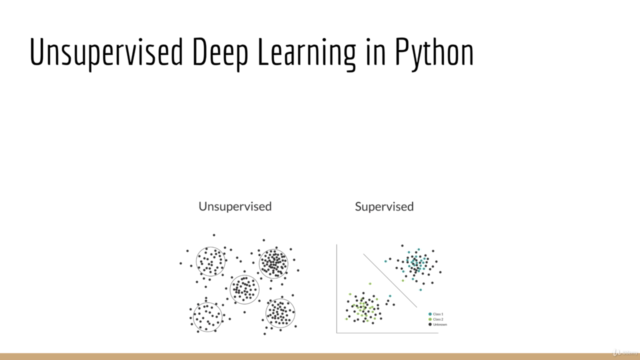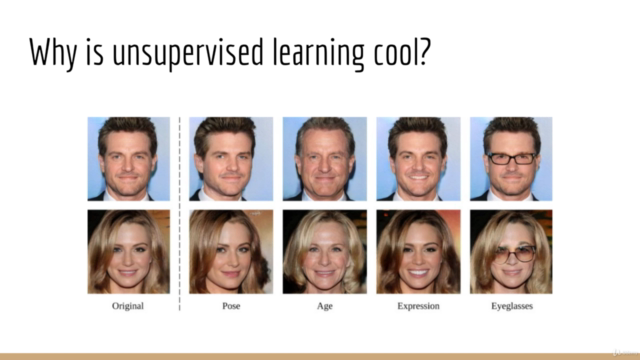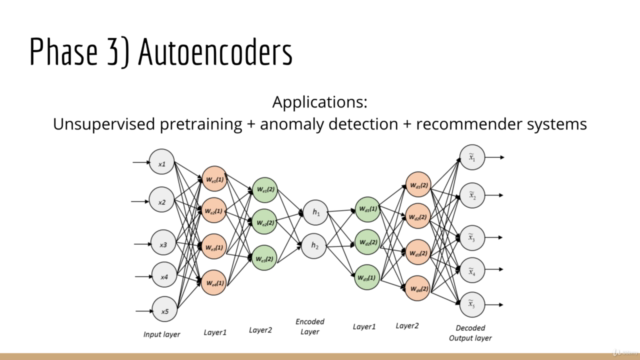Unsupervised Deep Learning in Python

Why take this course?
🚀 Course Title: Unsupervised Deep Learning in Python
🤖 Unlock the Secrets Behind AI Giants
Have you ever been intrigued by the capabilities of cutting-edge AI technologies like OpenAI's ChatGPT, GPT-4, DALL-E, Midjourney, and Stable Diffusion? In this comprehensive course, we'll dive into the foundations of these remarkable applications through the lens of Unsupervised Deep Learning.
🎓 Course Overview
This course is a natural progression in my series on deep learning, data science, and machine learning. With a solid foundation laid out in previous courses, including a detailed exploration of unsupervised learning with focus on clustering and density estimation, we're ready to explore the powerful world of Unsupervised Deep Learning. 🧠✨
📚 What You'll Learn:
-
The Basics: We'll start with an introduction to Principal Components Analysis (PCA) and a deep dive into t-SNE (t-distributed stochastic neighbor embedding), a crucial technique for dimensionality reduction.
-
Autoencoders: Discover how these neural networks work, how they can be stacked for better performance, and their similarities to PCA as a non-linear approach for data compression.
-
Deep Dive into RBMs: Explore the fascinating world of Restricted Boltzmann Machines (RBMs), their use in pretraining deep neural networks, and the training techniques like Gibbs sampling and Contrastive Divergence (CD-k).
-
Hands-On Learning: Visualize the features learned by autoencoders and RBMs through PCA and t-SNE, and witness how unsupervised learning can reveal patterns in data.
👨💻 Course Requirements:
-
A good grasp of calculus, linear algebra, and Python coding essentials (if/else, loops, lists, dicts, sets).
-
Proficiency in Numpy, Theano, and Tensorflow is highly recommended as these tools are indispensable in your data analytics journey.
🎯 Who Is This For?
This course is tailored for those who:
-
Have a genuine interest in deep learning and wish to delve beyond the basics of backpropagation.
-
Are eager to understand how machine learning models are constructed from the ground up.
-
Aspire to implement and not just use pre-built algorithms.
📚 Key Takeaways:
-
Implement Unsupervised Deep Learning algorithms from scratch, gaining a deep understanding of their mechanics.
-
Move beyond mere data input into libraries with 3 lines of code; learn to apply the same concepts across various datasets.
-
Engage in an interactive learning experience that goes far beyond surface-level knowledge.
📝 Suggested Prerequisites:
-
Calculus, Linear Algebra, Probability
-
Python coding proficiency with a focus on data manipulation and neural network implementation.
🚀 Ready to Embark on Your Unsupervised Deep Learning Journey?
Before diving into this course, consider the recommended order for my courses, as outlined in the "Machine Learning and AI Prerequisite Roadmap" (available in the FAQ of any of my courses, including the free Numpy course). This will ensure a solid foundation and maximize your learning experience.
Embark on this journey to transform your understanding and application of Unsupervised Deep Learning with hands-on, practical exercises that will elevate your expertise in machine learning. Let's unlock the power of AI together! 🌟
Course Gallery




Loading charts...
Comidoc Review
Our Verdict
This intermediate-level course provides in-depth instruction on unsupervised deep learning methods with ample Python examples to illustrate the mathematical concepts presented. Its comprehensive coverage of various algorithms and theory-focused approach sets it apart, but may intimidate beginners or those unfamiliar with Theano. Nonetheless, students will walk away with enhanced knowledge and confidence regarding more advanced deep learning training methods.
What We Liked
- The course covers advanced topics in unsupervised deep learning with a strong mathematical focus, providing in-depth explanations and justifications for algorithms.
- Examples implemented in Python help reinforce concepts, enabling students to immediately apply their learned knowledge.
- Course material is comprehensive, exhaustively describing numerous algorithms while offering intuitive explanations.
- The instructor encourages an active learning approach, prompting learners to pause the video for self-reflection and hands-on exercises.
Potential Drawbacks
- Some students might find explanations too complex or fast-paced, possibly requiring additional review of certain topics.
- A lack of beginner-friendly content may intimidate newcomers to unsupervised deep learning.
- Code demonstrations could benefit from more annotations and insights into individual steps, enhancing time efficiency.
- The course is focused on Theano code examples, with limited TensorFlow content making translation necessary for non-Theano users.